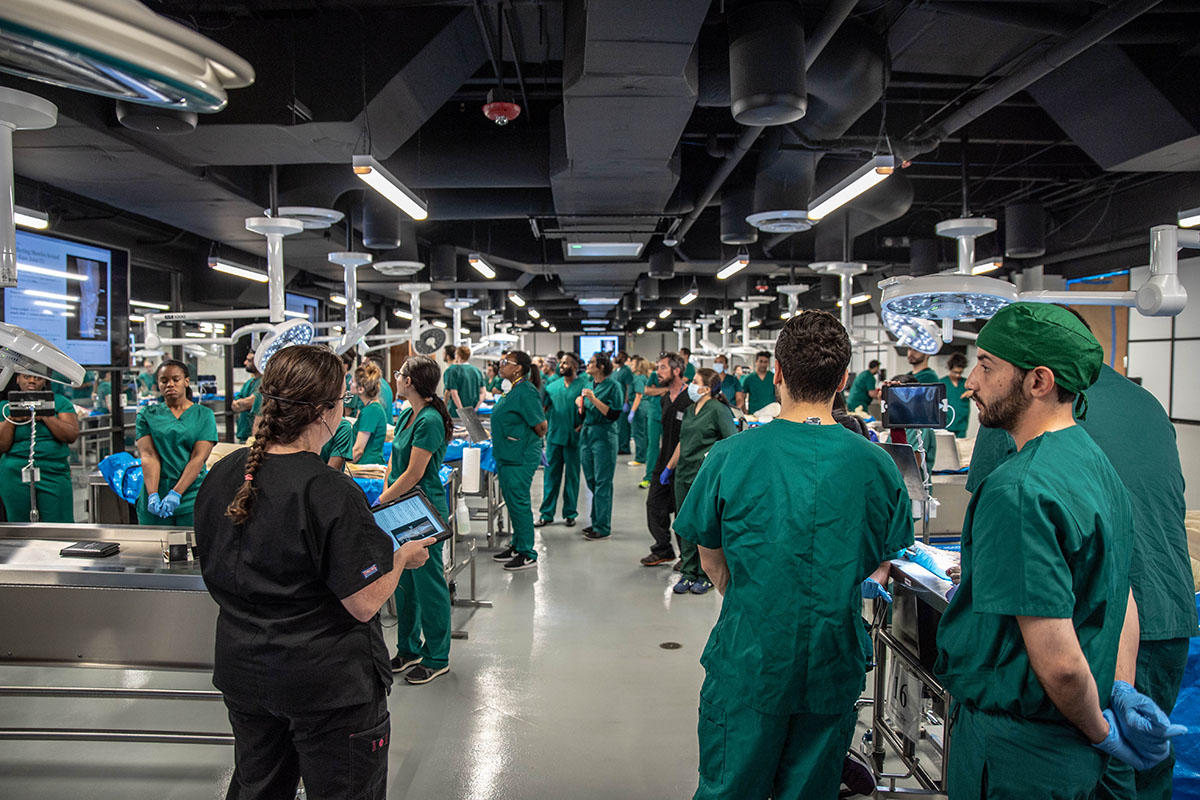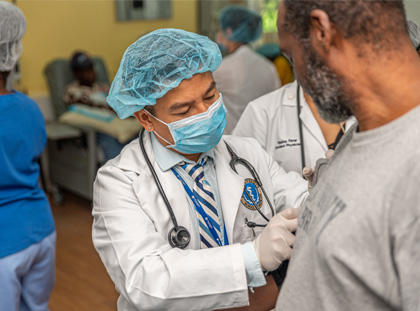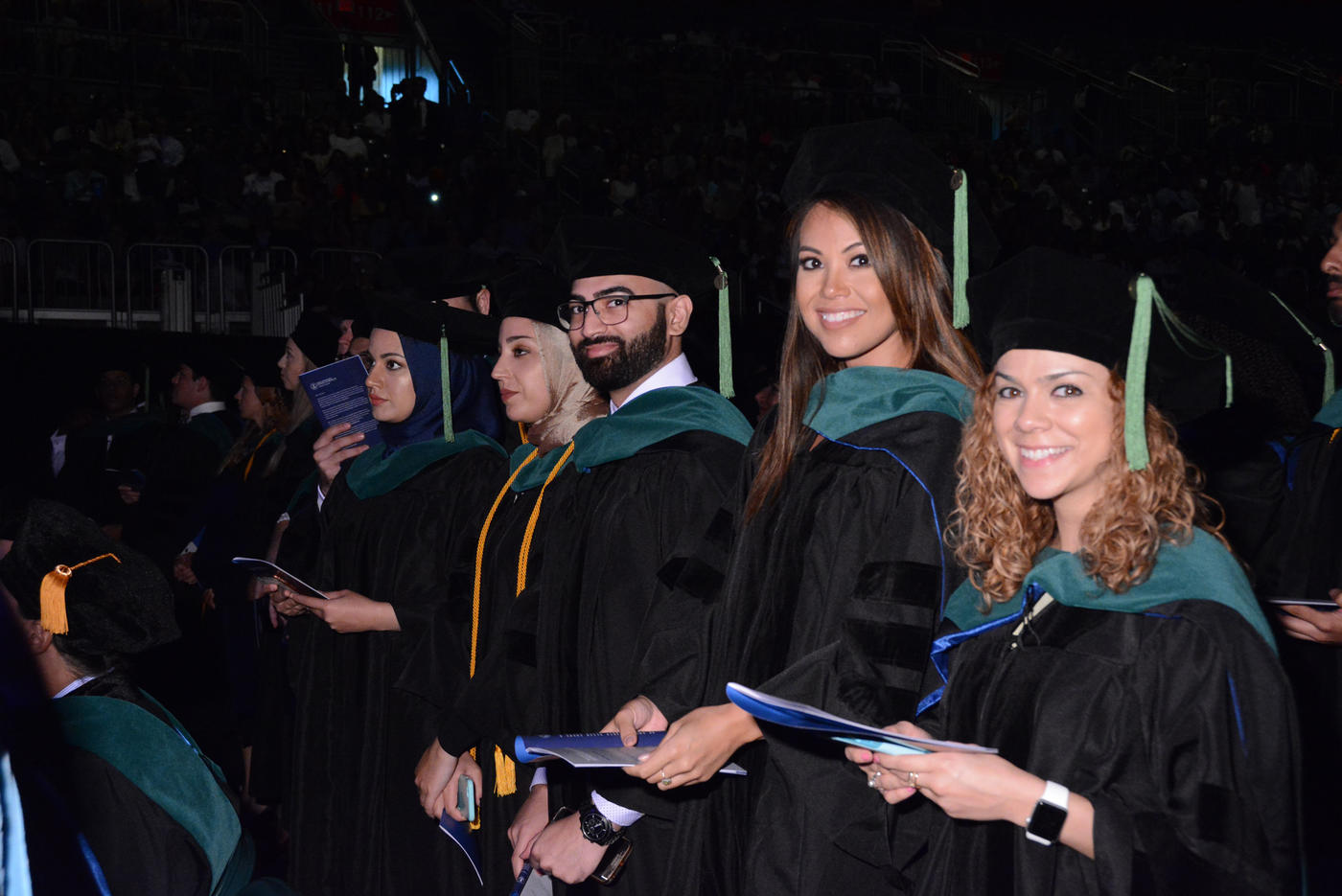The American College of Surgeons recognizes 14 surgical specialties, and within those specialties are several subspecialties—so the options are many. Most surgical specialties concentrate on a certain part of the body, such as the heart (cardiac surgeon) or the arteries and veins (vascular surgeon). Other specialties concentrate on age (pediatric surgeon) or gender (gynecology and obstetrics). Regardless of the specialty, it takes a lot of time and hard work to become a surgeon. Consider all the factors of each specialty, and then choose the one that suits you best. If you are uncertain which path to take, consider these questions:
- Do you prefer to work with a certain part of the body?
- Are you intrigued by the musculoskeletal system, the brain, or the eyes?
- Do you want to work with women and deliver babies?
- Are you up for a constantly challenging and evolving career?
- Is it your dream to scrub up and enter the operating room?
If you answer “yes” to any of these questions, a career in surgery may be for you. Just choose a specialty path—and choose wisely.
An Overview of Surgical Specialties
Every physician has some training in surgery and is qualified to perform simple operations. But surgeons—who operate to treat disease, deformities, or injuries—are specially trained to perform complicated procedures. Surgeons must be physically skilled to manipulate surgical tools, and they must have a wide knowledge of anatomy, chemistry, pathology, and physiology. Surgeons must also be able to diagnose problems in patients and care for them before and after the surgery.
After medical school, doctors must study for additional years to qualify as surgeons. Each surgical specialty has its requirements, boards, and associations. They all begin with an accredited medical (or dental) school—such as Ross University School of Medicine (Ross Med)*—followed by residencies and specialty training. You may be wondering: what type of surgeons are there? How many different types of surgeons exist? The 14 types of surgeons recognized by the American College of Surgeons are:
- Cardiothoracic surgery
- Colon and rectal surgery
- General surgery
- Gynecology and obstetrics
- Gynecologic oncology
- Neurological Surgery
- Ophthalmic surgery
- Oral and maxillofacial surgery
- Orthopedic surgery
- Otorhinolaryngology
- Pediatric surgery
- Plastic and maxillofacial surgery
- Urology
- Vascular surgery
Each of the surgery specialties is described below, including the commitment it will take to become a surgeon in that area.
General Surgery
Of all types of surgeons, general surgery includes a broad spectrum of surgical conditions affecting almost any area of the body. A general surgeon makes the diagnosis and provides the preoperative, operative, and post-operative care to patients. General surgeons are often responsible for the comprehensive care of trauma victims and critically ill patients. Surgeons must be capable of nearly all forms of surgery, and they should be able to handle a variety of emergencies and unexpected events in the operating room. Surgeons complete medical school and then five years of general surgery residency. They are certified by the American Board of Surgery, and they may apply for membership in the American College of Surgeons.
Cardiothoracic Surgery
Cardiothoracic surgery includes surgical procedures of the heart, lungs, esophagus, and other organs in the chest. Cardiac surgeons, cardiovascular surgeons, general thoracic surgeons, and congenital heart surgeons are included in this specialty. Cardiothoracic surgeons may perform transplant surgery or treat abnormalities of the great vessels and heart valves. They also treat angina pectoris (heart pain); cancers of the lung, esophagus, and chest wall; congenital anomalies; coronary artery disease; diseases of the diaphragm; heart disease; injuries to the chest; blockage of the airway; and tumors of the mediastinum. Cardiothoracic surgeons have substantial knowledge of cardiorespiratory physiology and oncology, and they are experts in endoscopy and extracorporeal circulation, the use of cardiac assist devices, and the management of cardiac dysrhythmias, pleural drainage, and respiratory support systems. Cardiothoracic surgeons complete four years of medical school, five years of general surgery residency, and two or more years of specialty training. Cardiothoracic surgeons are certified by the American Board of Thoracic Surgery, and they may apply for membership in The Society of Thoracic Surgeons.
Colon and Rectal Surgery
Colon and rectal surgery includes surgical procedures of the anal canal, colon, intestinal tract, perianal area, and rectum. Colon and rectal surgeons also deal with organs and tissues (such as the liver, urinary, and female reproductive systems) involved with primary intestinal disease. A colon and rectal surgeon must diagnose and manage such anorectal conditions as abscesses, constipation, fissures, fistulae, hemorrhoids, and incontinence. Colon and rectal surgeons also treat problems of the intestine and colon and perform endoscopic procedures to detect and treat such conditions of the bowel lining as cancer, inflammation, and precancerous polyps. Colon and rectal surgeons also perform abdominal surgical procedures involving the small bowel, colon, and rectum, including treatment of such inflammatory bowel diseases as chronic ulcerative colitis, Crohn's disease, diverticulitis, and cancer. Colon and rectal specialists have substantial knowledge of intestinal and anorectal physiology, and they are experts in diseases of the lower gastrointestinal tract. Colon and rectal surgeons complete four years of medical school, five years of general surgery residency, and one year of specialty training. Colon and rectal surgeons are certified by the American Board of Colon and Rectal Surgery, and they may apply for membership in the American Society of Colon and Rectal Surgeons.
Gynecology and Obstetrics
Gynecology and obstetrics combine to provide care for pregnant women and the delivery of babies, as well as the treatment of conditions of the female reproductive system. Surgeons in obstetrics/ gynecology—OB/GYN—may perform cesarean section (also spelled caesarean or simply called C-section) or other high-risk childbirths, hysterectomies, in vitro fertilization, reconstructive surgery, or urogynecological surgery. OB/GYN surgeons are experts in all aspects of women’s reproductive physiology. Gynecological and obstetrical surgeons complete four years of medical school and four years of obstetrics and gynecological residency. OB/GYN subspecialties require an additional two to four years of training. OB/GYNs are certified by the American Board of Obstetrics and Gynecology, and they may apply for membership in the American College of Obstetrics and Gynecology.
Gynecological Oncology
Gynecological oncology deals exclusively with cancers of the female reproductive system. Such cancers include cervical, ovarian, uterine, vaginal, and vulvar cancer, as well as rare fallopian tube cancer. Surgeons practicing in this specialty must understand the surgical treatments for these cancers as well as their many different causes, preventions, detections, and survival rates. Surgeons in gynecologic oncology complete four years of medical school, four years of obstetrics and gynecological residency, and three to four years of specialty training. They are certified by the American Board of Obstetrics and Gynecology and may apply for membership in the Society of Gynecologic Oncologists and the Society of Surgical Oncology.
Neurological Surgery
Neurological surgery (neurosurgery) treats disorders of the central, peripheral, and autonomic nervous systems, including their supporting structures and vascular supply. Neurological surgeons provide such nonoperative management as critical care, diagnosis, evaluation, prevention, and rehabilitation, as well as such procedures as endovascular surgery, functional and restorative surgery, spinal fusion, and stereotactic radiosurgery. Neurosurgeons treat disorders of the brain, the extracranial carotid and vertebral arteries, the meninges, and the skull. Neurosurgeons also treat disorders of the cranial and spinal nerves, the pituitary gland, the spinal cord, and the vertebral column. Neurological surgeons must complete four years of medical school and seven years of neurological surgery residency. Subspecialties require an additional year or two of training. Neurosurgeons are certified by the American Board of Neurological Surgeons and may apply for membership in the American Association of Neurological Surgeons.
Ophthalmic Surgery
Ophthalmic surgery treats diseases and disorders of the eyes. Ophthalmologists may provide corrective vision services (eyeglasses or contacts) or perform laser-assisted in situ keratomileusis (LASIK) or photorefractive keratectomy (PRK) surgeries to correct vision problems. They may also operate to treat such disorders as cataracts, diabetic retinopathy, glaucoma, macular degeneration, or strabismus (cross-eyes). Ophthalmic surgeons complete four years of medical school and four years of ophthalmology residency. Such subspecialties as cornea and external disease, ocular oncology, neuro-ophthalmology, or vitreoretinal disease require an additional year or two of training. Ophthalmologists are certified by the American Board of Ophthalmology, and they may apply for membership in the American Academy of Ophthalmology.
Oral and Maxillofacial Surgery
Oral and maxillofacial surgery treats defects, diseases, and injuries of the face, head, jaws, and neck, as well as the hard and soft tissues of the oral and maxillofacial region. Oral and maxillofacial surgeons may correct misaligned jaws, extract wisdom teeth, remove tumors or cysts, or perform dental implant surgery. Such specialists may also administer anesthesia and care of patients in an office setting. Oral and maxillofacial surgery is a dental specialty, so specialists must complete four years of dental school before four to six years of oral and maxillofacial surgery residency (six years includes acquiring a Doctor of Medicine degree). Subspecialties in cosmetic facial surgery, craniofacial surgery and pediatric maxillofacial surgery, cranio-maxillofacial trauma, and head and neck cancer require an additional year or two of training. Oral and maxillofacial surgeons are certified by the American Board of Oral and Maxillofacial Surgery, and they may apply for membership in the American Association of Oral and Maxillofacial Surgeons.
Orthopedic Surgery
Orthopedic (also spelled orthopaedic) surgery is devoted to the care of the musculoskeletal system—the body’s bones, joints, muscles, associated nerves, arteries, and the overlying skin. Orthopedic surgeons treat such problems as bone fractures, injuries to tendons and ligaments, and deformities of the limbs and spine. An orthopedist may use braces, casts, physical therapy, or splints to treat patients. Orthopedic surgery may be required to treat congenital deformities, degenerative conditions, infections, metabolic disturbances, trauma, and tumors. An orthopedic surgeon’s expertise may also include the surgical treatment of cerebral palsy, paraplegia, or stroke. Because of the wide scope of the musculoskeletal system, orthopedic surgery includes several subspecialties:
- Foot and ankle orthopedics
- Hand surgery
- Joint replacement
- Oncology
- Pediatric orthopedics
- Spine surgery
- Sports medicine
- Trauma surgery
Orthopedists complete four years of medical school and five years of orthopedic surgery residency. Subspecialties require an extra year or two of training. Orthopedic surgeons are certified by the American Board of Orthopaedic Surgery, and they may apply for membership in the American Academy of Orthopaedic Surgeons.
Otolaryngological Surgery
Otolaryngological surgery treats diseases and disorders of the head and neck, including the ears, nose, throat, and related structures. Otolaryngological surgeons—sometimes called ENT (ear, nose, and throat) surgeons—are experts in audiology, the chemical senses, speech-language pathology, allergy, endocrinology, and neurology as they relate to the head and neck. ENT surgeons also handle head and neck oncology and facial plastic and reconstructive surgery. Otolaryngologists may perform microvascular reconstruction or neurotologic procedures, as well as endoscopy to diagnose and treat sinus disease and laryngeal disease. Otolaryngologist surgeons complete four years of medical school and five years of otolaryngology residency. They are certified by the American Board of Otolaryngology and may apply for membership in the American Academy of Otolaryngology-Head and Neck Surgery.
Pediatric Surgery
Pediatric surgery treats diseases and conditions in children ranging from newborns to teenagers. Some medical conditions in newborns must be corrected surgically to improve quality of life. These conditions must be recognized by neonatologists, pediatricians, and family physicians. Pediatric surgeons work with these specialists to determine whether surgery is the best option. Pediatric surgeons must then consider how children react to surgery and anesthesia, and how it might affect their growth or development. Pediatric surgery covers a wide spectrum, providing care for all conditions affecting children that require surgical intervention. These conditions may include neonatal or prenatal problems, trauma, or pediatric oncology. Pediatric surgeons complete four years of medical school, five years of general surgery residency, and two years of specialty training. They are certified by the American Board of Surgery, and they may apply for membership in the American Pediatric Association-Section on Surgery and the American Pediatric Surgical Association.
Plastic and Maxillofacial Surgery
Plastic and maxillofacial surgery deals with the repair, replacement, and reconstruction of defects of the form and function of the body covering and its underlying musculoskeletal system. This type of surgery emphasizes the craniofacial structures, the oropharynx, the upper and lower limbs, the breast, and the external genitalia, as well as aesthetic surgery of structures with undesirable forms. These types of surgeons must acquire special knowledge and skill in the design and transfer of skin flaps, in the transplantation of tissues, and in the replantation of structures which are vital to the performance of plastic surgery. Skills in excisional surgery, the management of complex wounds, and the use of allopathic materials are also required. Plastic surgeons are experts in artistic anatomy, diagnosis, instrumentation, oncology, pathology, physiology, and surgical design, as well as bacteriology, biomechanics, embryology, and pharmacology. Plastic and maxillofacial surgeons complete four years of medical school and six years of specialized residency. Such subspecialties as cosmetic, hand, or craniomaxillofacial trauma and reconstructive surgery require an additional year or two of training. Plastic and maxillofacial surgeons are certified by the American Board of Plastic Surgery, and they may apply for membership in the American Society of Plastic Surgeons and related professional societies.
Urological Surgery
Urological surgery deals with disorders of the adrenal gland and of the genitourinary system. Urologists perform endoscopic, percutaneous, and open surgery on congenital and acquired conditions of the reproductive and urinary systems and their contiguous structures. They may treat dysfunction, inflammatory diseases, malignancies, or obstructions, and their expertise covers general urology as well as andrology, endourology, female urology, pediatric urology, and oncology. Urological surgeons complete four years of medical school and five or six years of urological surgery residency. They are certified by the American Board of Urology, and they may apply for membership in the American Urological Association.
Vascular Surgery
Vascular surgery treats diseases and disorders of the arteries and veins in all parts of the body but the brain and heart. Vascular surgeons most often treat atherosclerosis—hardening of the arteries—but they also treat peripheral vascular disease in the legs and feet, aneurysms and blood clots in the arteries and veins, and strokes caused by blockages or narrowing of the arteries in the neck. Beyond the operating room, vascular surgeons treat many patients by recommending dietary changes, medication, or exercise. Vascular surgeons are also skilled at the early diagnosis of potential stroke victims and in post-operative care. Vascular surgeons complete four years of medical school, five years of general surgery residency, and two years of vascular training. They are certified by the American Board of Vascular Medicine, and they may apply for membership in the Society for Vascular Surgery.
Meet a Surgeon
Joel Calafell, MD, a 2014 graduate of Ross Med, is a general surgeon at Baptist Health Medical Group in Miami, Florida. Dr. Calafell specializes in colon and rectal surgery and has extensive training in robotic surgery. We chatted briefly with Dr. Calafell about being a surgeon.
Q: Why did you decide to go into your specialty?
A: I love the anatomy of the human body. Surgery allows me to truly cure a patient of an ailment, and not just treat it.
Q: Any advice to medical students considering the specialty?
A: Study hard and get as much exposure as possible. Learn anatomy better than God.
Q: What’s the most rewarding part of your job?
A: The thanks from a patient after a successful surgery.
No matter which of these surgeon specialties appeals to you most, Ross University School of Medicine is a good place to start. Ross Med graduates have advanced to general surgery and numerous other medical residencies. In 2022-2023, the first-time residency attainment rate for Ross Med graduates was 98 percent.✝ Take the next step on your path to becoming a surgeon: check out our Doctor of Medicine (MD) program, the requirements for admission, and when you're ready, apply for admission to Ross Med.
Frequently Asked Questions
What is the hardest surgeon to be?
It’s difficult to become any type of surgeon, but if you want to equate “longest” with “hardest,” then the answer is neurological surgery, which has a seven-year residency—the longest of all postgraduate surgical residencies. It is (often) brain surgery, after all.
Are there other specific types of surgeons?
Absolutely! Most of the 14 types of surgeons have numerous subspecializations. For example, neurological surgeons can subspecialize in such disciplines as brain tumor neurosurgery, endovascular and cerebrovascular neurosurgery, functional neurosurgery, neurosurgical oncology, neurotrauma and neurocritical care, pediatric neurosurgery, peripheral nerve surgery, or spinal surgery. Each of these subspecialties requires an additional fellowship on top of the seven-year residency, meaning still more time dedicated to education and training.
Which type of surgeon gets paid the most?
. Of course, numerous factors decide the income of individual surgeons
Related resources:
*Ross University School of Medicine is accredited by the Caribbean Accreditation Authority for Education in Medicine and other Health Professions (CAAM-HP, www.caam-hp.org).
✝First-time residency attainment rate is the percent of students attaining a 2023-24 residency position out of all graduates or expected graduates in 2022-23 who were active applicants in the 2023 NRMP match or who attained a residency position outside the NRMP match.




